American View
Feature
Growing Older Beats Getting Old

Before Batya Perman parted with the heirloom oak bookcase that stood sentinel in her home for 43 years, she carefully perused its volumes in order to distribute and discuss them with her family. She located a master woodworker to disassemble the bookcase into smaller pieces so it could fit through the doorway of her son Uri’s new home. A legacy from her great-uncle, New York State Supreme Court Justice Harry Lewis, it now holds Uri’s own books and mementos as well as the law and Judaica titles he inherited, including a chumash inscribed to his great-grandfather.
Like the process of moving the bookcase, aging well takes planning, says Perman, 68, a pioneer in the field of senior move management, which helps older adults and their families “rightsize” when they downsize—paying attention to what has value and meaning as they transition to a new home. Perman is also director of the Wise Aging program at the Institute for Jewish Spirituality in Manhattan, whose goal is to reframe later years as a time of opportunity instead of decline. Based on the book Wise Aging: Living with Joy, Resilience and Spirit by Rabbi Rachel Cowan and Linda Thal, the three-year-old nationwide network has trained over 400 facilitators to guide peer groups for people who want to face the next phase of their lives with self-awareness, equanimity and intentionality.
The unprecedented bubble of baby boomers now in midlife and beyond is motivating the call for new thinking on aging. “No limits. No labels. Aging is changing,” proclaims AARP’s website. United States Census Bureau figures estimate that there are more than 76 million boomers, defined as those currently 54 to 72 years old, with 10,000 people a day turning 65. By 2029, when all boomers will be 65 and older, they will represent more than 20 percent of the total United States population, according to the census bureau. In the Jewish community, the median age is 50, compared to 46 in the general public, according to the Pew Research Center.
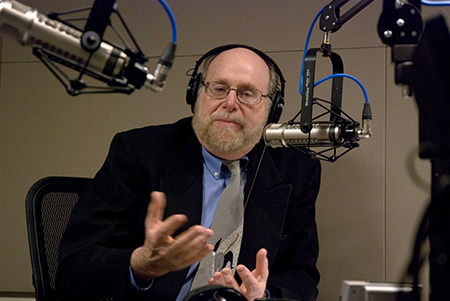
“Baby boomers are seeking community, driven by the need for relationships and socialization, and for their Judaism to speak to their life changes,” says Rabbi Richard Address, 73, founder and director of Jewish Sacred Aging, an online forum with resources and texts, a podcast and a Facebook page with 27,000 followers. His offerings and the Wise Aging program at the Jewish Spirituality institute are among a number of initiatives that have sprung up in the Jewish community in recent years to directly address the emotional and psychological components of aging. “This is a spiritual revolution that focuses on fundamental human questions of meaning, life and purpose: Who am I? What is my place? What do I want my legacy to be?” says Address.
“The path beyond midlife is a process of becoming—of confronting change, of meeting new challenges and of continually being called to grow in response to them,” says Rabbi Dayle A. Friedman, 62, author of Jewish Wisdom for Growing Older: Finding Your Grit and Grace Beyond Midlife and founder of Growing Older, a Philadelphia-based national practice offering resources to older people, caregivers and communities. “Whether we are contemplating retirement, caring for a dear one, facing physical limitations or taking on new adventures, our lives are not static. The task for any of us on this path is to grow older, not just to be old.”
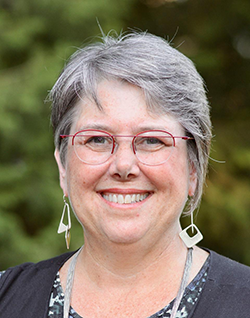
Those in the generation that wants to stay forever young are actually the first in history to consider the real possibility of living until their 90s and even 100 and beyond—and that spells more freedom and purposeful living. Wise aging groups, encore careers, activism, volunteerism and new rituals are some of the ways boomers are learning to inhabit the so-called third stage of life. Several recent books address the subject directly and leaders in the field hope to smash the stereotypes of older people as a burden on society, viewing them instead as role models and success stories.
Rabbi Laura Geller, 68, rabbi emerita of Temple Emanuel, a Reform congregation in Beverly Hills, Calif., points out that no single name for this period of life has caught on. “Am I a senior? An elder? An older adult?” asks Geller, who, along with her 70-year-old husband, Richard Siegel, helped found ChaiVillageLA, which assists older adults in maintaining vibrant lives while remaining in their own homes. The village concept counters the three main fears Geller found when she surveyed her older congregants: being invisible, isolated and dependent. Their village is part of the nondenominational neighbor-helping-neighbor movement that began about 15 years ago and now includes over 200 villages across the country.
“People have been getting old forever, but with the extension of longevity, we now have a new phenomenon between retirement and frail old age. What will we do with that middle part of our lives that will sustain our vitality?” asked Siegel, who passed away in July after a two-year cancer battle.
Though the negative implications of getting old still spawn stigma, self-loathing and a reticence to address the future, Siegel said that more and more, people are approaching aging with a realistic outlook. Perhaps best known as co-editor of the The First Jewish Catalog: A Do-It-Yourself Kit that has sold over 300,000 copies since its 1973 publication, Siegel completed a hands-on guide with Geller aimed at the same boomer cohort. Getting Good at Getting Older, which is scheduled to be published next year, includes practical sections on wisdom, relationships, health, getting organized, volunteerism and “giving stuff away.”
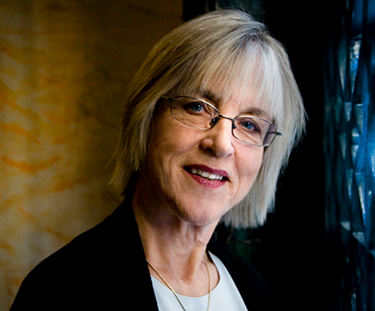
In their work, Rachel Cowan and Linda Thal focus on the phrase “wise aging”: learning to accept your life as it is, discovering how to make the best choices and becoming more resilient in difficult times. Unwise aging, says Cowan, “would be pretending you are not getting older, not living as fully as possible and not making any preparation for illness or death.” Cowan herself dealt with loss at a relatively young age: When she was 47, her husband, Paul Cowan, was diagnosed with leukemia, dying at 48. “We learned to say, ‘We have this day.’ You can have great pain and loss in life and still be happy.”
In Scottsdale, Ariz., a recent gathering of participants and facilitators from nine local Wise Aging groups—mostly women—celebrated the one-year anniversary of their meetings. They were educators, lawyers, doctors, psychologists, social workers, event planners, engineers and businesspeople. Some were retired, others were not. Over breakfast, they talked about the deep friendships they had made while engaging in eye-opening discussions on topics from body image to forgiveness.
Linda Levin, 61, a child and family educator who directs the Wise Aging program in Phoenix and facilitates one of the groups, says that by helping others, the program helped her embrace her own aging instead of being fearful. “We can let go of some narrative and negativity of the past,” she says. “If we can’t play tennis, maybe we can swim or walk or take Pilates, learn a language, expand
our minds.”
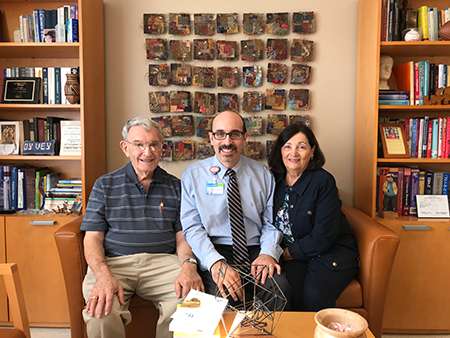
Nancy Pollinger, 64, who participated in Levin’s group, relocated to Phoenix three years ago after living in Baltimore all her life. She wanted to be near her children and grandchildren, but in doing so, had to leave her parents behind. “I had a lot of heartache over that,” Pollinger says, adding that the group helped her gain more peace of mind. “It’s a forum for realities that usually get pushed under the rug.”
The group also provided the Jewish connection she was seeking. Pollinger had been active in her synagogue and community in Baltimore, but in her new surroundings, she couldn’t figure out “where to fit in.”
“By living, I’m aging, so they are one and the same,” says Laura Rotter, 58, who found her way to a Wise Aging group for different reasons. She was a successful Wall Street money manager until five years ago, when she realized she was bored and uninspired in her career. Like others who change direction in midlife, she questioned whether her profession aligned with her values. She became a yoga teacher, established a daily meditation practice, enrolled in a two-year course at the Institute of Jewish Spirituality and founded her own financial planning firm.
After her mother retired and began to struggle with physical disabilities, Rotter decided to pursue the Wise Aging training and facilitated a group at her Reconstructionist synagogue, Bet Am Shalom in White Plains, N.Y. The eight women in her group faced a variety of issues: one lost her husband and mother in the same year, another was recovering from both breast cancer and divorce.
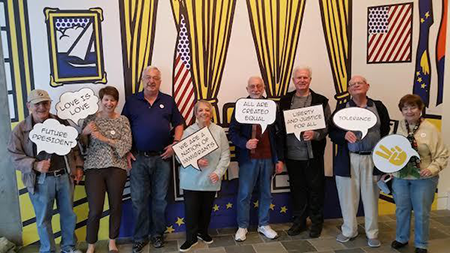
Jewish leaders on aging believe that synagogues can serve as starting places for the journey. Address, the rabbi who heads Jewish Sacred Aging, guides congregations in instituting “legacy programs” where people build “spiritual autobiographies” that help them think about their beliefs, goals and the ethical legacies they hope to leave behind. He also structures separate workshops on caregiving, economics and new rituals written by laypeople and rabbis. The rituals, often expressed through prayer, tackle life transitions like solemnizing unmarried adult cohabitation, becoming an empty nester, leaving a family home, being welcomed into a nursing home and signing an advanced directive or living will.
“Judaism has a tradition of venerating elders as well as tools for spiritual work, from daily gratitude to forgiveness,” says Friedman of Growing Older. She cites a comment by the medieval sage Isaac ben Judah Abravanel on Psalm 90:10, which states that the days of a person’s life are 70. Paraphrasing Abravanel, Friedman says: “Every time we encounter a seven in Jewish life, its purpose is to remind us of our mortality. We have sevens in the cycle of the week, the number of days in our holidays, week of mourning and wedding blessings.”
Despite that built-in wisdom, Friedman warns that the Jewish community’s fear for its future sets up a focus on the young that often dismisses the old. “Synagogues worry about attracting and maintaining young families but not much about those in midlife and beyond who are leaving in droves. We need community more than ever as we age.” Some organizations are taking notice: B3/The Jewish Boomer Platform and the Union for Reform Judaism’s Engaging Baby Boomers Community of Practice are introducing new outreach efforts for boomers and beyond.
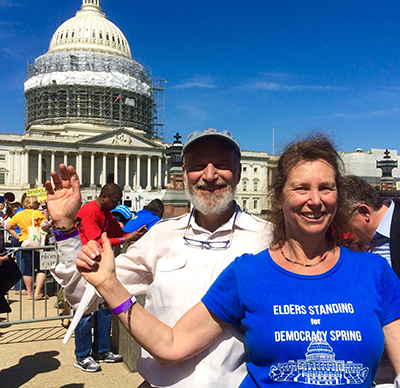
“You could argue that a good synagogue is a village,” said ChaiVillageLA’s Siegel, who retired in 2015 as head of Hebrew Union College-Jewish Institute of Religion’s Zelikow School of Jewish Nonprofit Management. He applied for and received a grant for the village from the Jewish Community Foundation of Los Angeles—but the foundation stipulated that Temple Emanuel had to partner with another local synagogue. Temple Isaiah, also a Reform congregation in the Los Angeles area and formerly a competitor for members, came on board, and ChaiVillageLA was born.
The 216 people who have joined—including Siegel and Geller—get together for member-initiated activities from walking and gardening groups to museum tours and movie nights. At its Passover seder this year, the Four Elders replaced the Four Children, and people told their own stories. “Villagers” give back by volunteering in the synagogue offices, providing fellow members with rides to the doctor and more. “It’s life-changing because it replaces dependence with interdependence,” says Geller. “It’s also a win-win for synagogue and village, as people are joining both.”
Some groups that meet the need for socialization and community are not geared solely to seniors. Shireinu Choir of Long Island, a new community choir in Great Neck, N.Y., drew 50 participants ages 32 to 80 when it was created last fall. “People crave connection as they get older,” says Sherry Husney, 63, one of the founders.
“The process of singing and performing helps maintain mental acuity, and the social aspect helps combat isolation,” says conductor Deborah Tartell, 59, whose mother is still singing in her synagogue choir in Cherry Hill, N.J., at the age of 93. At a recent rehearsal, Tartell led the group through Leonard Bernstein’s “Something’s Coming” from West Side Story. “Will it be? Yes, it will,” they sang. “The air is hummin’ and something great is comin’.”
One member, Madelyn Gould, 66, a soprano, is a professor of epidemiology at Columbia University Medical Center who makes time for both the choir and weekly Israeli dancing. When her children were younger, she concentrated on work and family, she says. Now that her children are grown, she doesn’t want work to take up her whole life. These activities “are support systems for me and enhance my feelings of belonging. As I see more years in my future, I want them to be shared with good friends in activities that are fun.”
Embracing the wisdom, purpose and creativity that age grants us is the antidote to feeling old,” says Dr. Marc Agronin, 58, a geriatric psychiatrist at Miami Jewish Health Systems, a health care provider with a range of services, and author of The End of Old Age: Living a Longer, More Purposeful Life. “In my practice, people come to me in some of the sickest, most debilitating stages. But I also see how they meet and overcome challenges with a positive attitude and a sense of hope,” he says as he packs his car with kosher deli, a treat for his parents, who live across the state on the Gulf Coast of Florida. Growing up in the small town of Appleton, Wis., amid a large extended family that included both sets of great-grandparents, “it was natural to be around old people and learn from them.” His maternal grandmother, Eva Cherkasky, shaped his vision of aging, he says. “She was the embodiment of the wise elder who passed along her knowledge, care, concern and action.”
Involvement in organizations and social activism can help people remain connected and active. Agronin says all the women in his family, back to his great-grandmothers in the 1920s, have been Hadassah members; Cherkasky led the Appleton chapter. Like so many members of Hadassah today, Agronin says of his family members: “Hadassah anchored them to their Jewish identity and faith as well as to generations of women in their family who worked to better the community.” It also connected them to Zionism and the State of Israel.
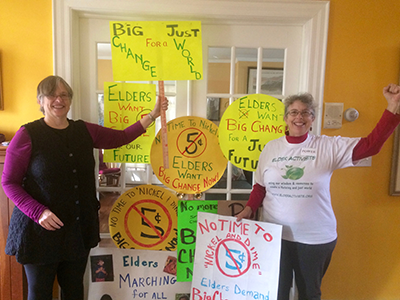
Lynne Iser, 68, an activist in Philadelphia, encourages elders to reclaim their voices to speak for the welfare of all. She devotes her efforts to social and environmental justice issues as a leader in the 5,000-strong Conscious Elders Network and is the founder of Elder Activists, a website that promotes social justice. Nine years ago, her daughter Anna, now 25, motivated her activism. “We shared the same concerns—but her anguish allowed me to feel my own responsibility at a deeper level,” she says. Iser suggests that when older activists go on marches or write letters to the editor, they identify as elders: “A mother of five soon to be a grandmother,” for instance, rather than a member of the Sierra Club. At a recent rally in Philadelphia urging the local utility company to support local jobs that would benefit low-income communities by purchasing solar energy generated in its service area, she and a group of elders chanted, “Tell me what an elder looks like! This is what an elder looks like!”
The inner work of wise aging requires an outer expression, says Iser, who in 1990 co-created the multifaith Spiritual Eldering Institute with the late Jewish Renewal founder Reb Zalman Schachter-Shalomi. (The organization has since morphed into Sage-ing International.) “Some of us look at the world we are leaving to future generations and think it’s a mess. Our legacy is tikkun olam.”
On a personal level, many aging experts are confronting difficult tipping points themselves. Address has officiated at the funerals of three close friends. Cowan is battling brain cancer. Friedman recently became an empty nester, and although she is looking forward to new professional possibilities, the finitude of life has also hit her hard. Three years ago, she lost her older sister, Jill Friedman Fixler, to bone marrow cancer. “There’s no pill or medical treatment in the world that will give you a good old age,” says Friedman, “but you can get it through honing qualities of character, heart and soul so you can face whatever comes with courage, humor and love.”
Old age, she adds, is like a pomegranate. “From the outside you have no idea that the inside is ripe and juicy. People think old age is a time of sadness and decline but from the inside it can be a time of discovery, healing and wholeness.”
Books to Explore
The End of Old Age: Living a Longer, More Purposeful Life, by Dr. Marc Agronin (Da Capo)
Wise Aging, by Rabbi Rachel Cowan and Linda Thal (Behrman House)
Jewish Wisdom for Growing Older: Finding Your Grit and Grace Beyond Midlife, by Rabbi Dayle A. Friedman (Jewish Lights)
Getting Good at Getting Older: A Jewish Catalog for a New Age, by Richard Siegel and Rabbi Laura Geller (Behrman House, March 2019)
Seekers of Meaning, by Rabbi Richard Address (Behrman House)
Resources
Wise Aging is a program of the Institute for Jewish Spirituality that offers facilitators and training for national peer groups.
Jewish Sacred Aging is a forum with resources, texts and discussions for baby boomers and their families.
Growing Older offers pastoral counseling, teaching and resources for older people, caregivers and communities.
B3/The Jewish Boomer Platform and URJ’s Engaging Baby Boomers Community of Practice are introducing new outreach efforts to the boomer population.
Conscious Elders Network is actively addressing societal and environmental challenges facing the United States today.
Sage-ing International works to transform “aging” to “sage-ing” through workshops, webinars, wisdom circles, Sage-ing chapters, online resources and conferences.
Elder Activists educates and inspires elders to create the legacy of a just future.
Moving Mentor specializes in moves for seniors and their families in metropolitan New York and
New England.
AARP provides a wide range of resources and information related to aging.
American Society on Aging provides educational resources, conferences and publications for practitioners, educators, administrators, policymakers, businesspeople, researchers and students in the field of aging.
Rahel Musleah, a frequent contributor to Hadassah Magazine, leads tours of Jewish India and speaks about its communities (explorejewishindia.com).








 Facebook
Facebook Instagram
Instagram Twitter
Twitter
Nancy Rose says
Thank you for this important article.
sheila says
This is an inspiring and energizing article! Thanks, dear Hadassah!